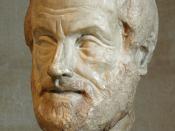Aristotle's Own Plato may have been the greatest of Greek philosophers. But he failed to convince his greatest student of these doctrines. As founder of the Academy, he set up the first school in Athens. It was here that Aristotle came to study. Though Aristotle was a student of Plato, he spent his life developing his own theories and concepts quite different from those of Platonists. Aristotle went on to create the Lyceum school, also located in Athens. It was here he spread his doctrines on the use of observational research, as well as the role of God. It was these doctrines that demonstrated Aristotle's separation from Platonists.
A key premise that set Aristotle apart from his mentor, Plato, was the importance he placed on observation. This is particularly visible in Aristotle's use of dissection. While Plato relied entirely on reason for his anatomical theories, Aristotle was inclined to not only observe the external parts of animals, but the internal ones as well.
The following quotation of Aristotle emphasizes the importance he placed on dissection, ""æanyone who is willing to take significant trouble can learn a great deal about each of the different types of plants and animals through dissection,"� in G.E.R. Lloyd's Early Greek Science: Thales to Aristotle. Aristotle was also able to apply observation to Physics. He discovered that when an object comes into contact with another, the distance the second object moves is proportional to the force of the first object. In contrast to Plato, Aristotle used observation, such as this to make accurate deductions of the natural world.
In addition to his focus on observation, Aristotle's teaching's also differed from the Platonists on the topic of change. Platonists believed that matter was made up of the five perfect solids. These solids...


